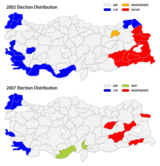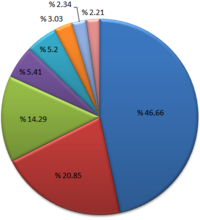
The Republican People's Party is a Kemalist and social democratic political party in Turkey. It is the oldest political party in Turkey, founded by Mustafa Kemal Atatürk, the first president and founder of the modern Republic of Türkiye. The party is also cited as the founding party of modern Turkey. Its logo consists of the Six Arrows, which represent the foundational principles of Kemalism: republicanism, reformism, laicism (Laïcité/Secularism), populism, nationalism, and statism. It is currently the second largest party in Grand National Assembly with 131 MPs, behind the ruling conservative Justice and Development Party.
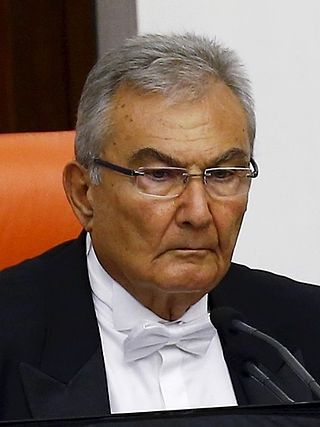
Deniz Baykal was a Turkish politician. A member of the Republican People's Party (CHP) who served as Deputy Prime Minister and Minister of Foreign Affairs from 1995 to 1996. Having served in numerous government positions, Baykal led the CHP from 1992 to February 1995, from September 1995 to 1999 and again from 2000 to 2010. Between 2002 and 2010, he also served as the Leader of the Opposition by virtue of leading the second largest party in the Parliament.

The Nationalist Movement Party is a Turkish far-right, ultranationalist political party. The group is often described as neo-fascist, and has been linked to violent paramilitaries and organized crime groups. Its leader is Devlet Bahçeli.

The multi-party period of the Republic of Turkey started in 1945.

The Democratic Society Party was a Kurdish nationalist political party in Turkey. The party considered itself social-democratic and had observer status in the Socialist International. It was considered to be the successor of the Democratic People's Party (DEHAP). The party was established in 2005 and succeeded in getting elected more than ninety mayors in the municipal elections of 2009. On 11 December 2009, the Constitutional Court of Turkey banned the DTP, ruling that the party has become "focal point of activities against the indivisible unity of the state, the country and the nation". The ban has been widely criticized both by groups within Turkey and by several international organizations. The party was succeeded by the Peace and Democracy Party.
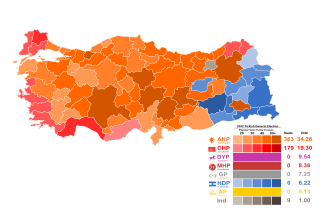
General elections were held in Turkey on 3 November 2002 following the collapse of the Democratic Left Party–Nationalist Movement Party–Motherland Party coalition led by Bülent Ecevit. All 550 members of the Grand National Assembly were up for election.

General elections were held in Turkey on Sunday 24 December 1995, triggered by the newly re-established Republican People's Party's (CHP) withdrawal from a coalition government with the True Path Party (DYP). The coalition had been in government for four years, having been formed by the Social Democratic Populist Party, the CHP's predecessor.

Kemal Kılıçdaroğlu is a Turkish politician who served as the leader of the Republican People's Party (CHP) from 2010 to 2023. He was Leader of the Main Opposition in Turkey between 2010 and 2023. He served as a member of parliament for Istanbul's second electoral district from 2002 to 2015, and as an MP for İzmir's second electoral district from 2015 to 2023.

Local elections were held in Turkey on 29 March 2009. The overall winner was the ruling party Justice and Development Party, although the party saw a decline in its vote relative to the 2007 general election. The leading opposition party, the social democratic Kemalist CHP, increased its vote share, as did a number of smaller parties including the SP, DTP and BBP, whose party leader Muhsin Yazıcıoğlu had died in a helicopter crash four days before the election. The third largest party, the Turkish nationalist MHP, enjoyed a more modest vote surge. The election was not contested by Cem Uzan's GP. The AKP failed to take certain provinces it had publicly targeted, such as Diyarbakır, İzmir and Urfa, and did not achieve its goal of exceeding 47% of the overall vote. There was localized election-related fighting in southeastern Turkey, in which five people were reported to have been killed and about a hundred injured.

Meral Akşener is a Turkish politician, teacher, historian and academic who is the founder of the Good Party.

The Turkish local elections of 2004 were held throughout the eighty-one Provinces of Turkey on 28 March 2004 in order to elect both mayors and councillors to local government positions. All 16 metropolitan and 3,193 district municipalities were up for election, while 3,208 provincial and 34,477 municipal councillors were also elected. More than 50,000 neighbourhood presidents (muhtars) were also elected, though these do not have any political affiliations.

General elections were held in Turkey on 12 June 2011 to elect the 550 members of Grand National Assembly. In accordance to the result of the constitutional referendum held in 2007, the elections were held four years after the previous elections in 2007 instead of five.
The outcome (in %) of the Turkish local elections after 1980 is shown below.. In the local elections in addition to mayors and muhtars, members of local parliaments are elected. The voter base of the local parliaments and the national parliament is assumed to be identical. In the table, only those parties which received more than 1% are shown.
The December 2009 Kurdish protests in Turkey were five days of protests in Turkey that ensued after a December 11, 2009 ruling by the Constitutional Court of Turkey that banned the pro-Kurdish Democratic Society Party (DTP), after finding them guilty of having links to the outlawed Kurdistan Workers' Party (PKK) and spreading "terrorist propaganda."
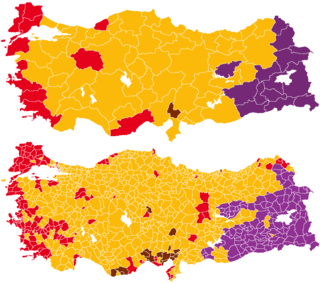
General elections were held in Turkey on 7 June 2015 to elect 550 members to the Grand National Assembly. This was the 24th general election in the history of the Turkish Republic, electing the country's 25th Parliament. The result was the first hung parliament since the 1999 general elections. Unsuccessful attempts to form a coalition government resulted in a snap general election being called for November 2015.
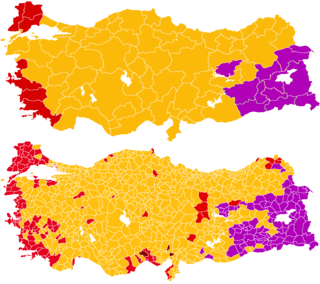
General elections were held in Turkey on 1 November 2015 to elect 550 members to the Grand National Assembly. They were the 25th general elections in the History of the Republic of Turkey and elected the country's 26th Parliament. The election resulted in the Justice and Development Party (AKP) regaining a parliamentary majority following a 'shock' victory, having lost it five months earlier in the June 2015 general elections.
Kutbettin Arzu was a Turkish politician who served as the Minister of Food, Agriculture and Livestock in the interim election government formed by Prime Minister Ahmet Davutoğlu between 28 August and 17 November 2015. He was a Justice and Development Party (AKP) politician, having served as a Member of Parliament for the electoral district of Diyarbakır between 2007 and 2011. He was the AKP's mayoral candidate for Diyarbakır in the 2009 local elections, but lost to the pro-Kurdish Democratic Society Party (DTP).

The Good Party is a nationalist, Kemalist and conservative political party in Turkey, established on 25 October 2017 by Meral Akşener. The party's name and flag is a reference to the tamga of the Kayı tribe.
The Republican People's Party was founded in 1919 during the Sivas Congress.
The Justice Party is a liberal conservative political party in Turkey. The party is situated on the centre-right of the political spectrum, and considers itself a successor to the historical Justice Party of Süleyman Demirel, active from 1961 to 1981. The modern incarnation of the party was established on 9 October 2015 by Vecdet Öz, a former member of the centre-left Republican People's Party.








